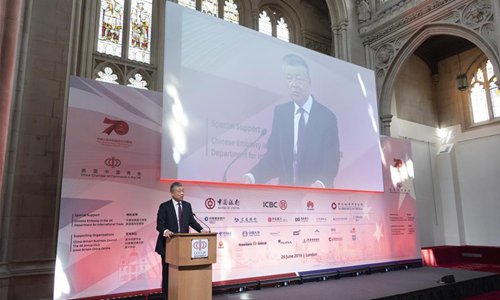Chinese envoys speak out on Twitter
Diplomats tweeting showcases China’s confidence: experts

Chinese Ambassador to Britain Liu Xiaoming delivers a keynote speech at the 2nd China-UK Economic and Trade Forum in London, June 26. With around 250 attendees from both countries, the forum focused on two topics, which are "the development of China-UK economic and trade relations, and new cooperation opportunities" and "the new measures of China's opening up and China-UK cooperation on the Belt and Road Initiative." Photo: Xinhua
Chinese Ambassador to the UK Liu Xiaoming on Monday questioned in a tweet some media reports which chose not to report neo-extremist activities in Hong Kong after unrest broke out again in the city on Sunday.
"Is free press really free when newspapers and broadcasters choose not to report 'neo-extremist' activities of looting, setting fire, attacking police and assaulting innocent people perpetrated by radical demonstrators in Hong Kong?" said the tweet.
An internet user commented on Liu's tweet with a video showing violent protesters throwing Molotov cocktails at police officers and reporters, saying the "video says it all."
More Chinese diplomats have created personal Twitter accounts to interact with international public opinion in a trend that Chinese analysts believe will lend voice to the Chinese people's mainstream position, showcase the country's confidence and reduce Western misunderstandings.
Liu and Chinese Ambassador to South Africa Lin Songtian created Twitter accounts in October and September.
In June, Chinese Ambassador to the US Cui Tiankai created personal Twitter accounts.
In their tweets, the Chinese diplomats made clear China's position, questioned Western media reports and exchanged views with other ambassadors and experts worldwide.
Most of the diplomats have thousands or tens of thousands of followers on Twitter. On the platform, observers said the envoys can voice their personal views to quickly respond to misunderstandings of China.
Cui said in his third tweet on July 12: "Taiwan is part of China. No attempts to split China will ever succeed. Those who play with fire will only get themselves burned. Period."
The tweet attracted over 2,900 comments and 2,000 "likes" as of press time.
"Chinese diplomats creating Twitter accounts shows that China is taking more initiative in diplomacy," Zhang Tengjun, an assistant research fellow at the China Institute of International Studies, told the Global Times.
China used to passively respond to the international public opinion, Zhang said.
"But now we proactively communicate with netizens worldwide, which helps reduce some Western misunderstandings of China," he said.
Zhao Lijian, currently deputy director general of the Chinese Foreign Ministry's information department, created his Twitter account as early as May 2010.
In July, Zhao, one of the most active Chinese diplomats on Twitter, had an online dispute with Susan Rice, US Ambassador to the UN.
BBC News published an article arguing China was launching "wolf warrior" diplomacy.
"Western double standards allow different opinions inside the Western world but regard external diversified views as a challenge," Zhang said.
Chu Yin, professor at the University of International Relations in Beijing, told the Global Times that it was a "heartening step" for Chinese diplomats to create Twitter accounts. "But this is only the first step," Chu said.
"The key thing is to not lose the common touch," he said.
"Speaking in our national interest, on just grounds and with restraint to seek good relations with other countries has always been the requirement of diplomats."